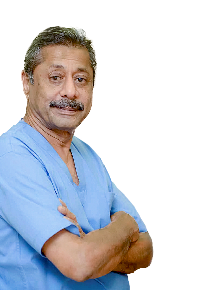THE EXCHANGE | Newsletter April 2020

Merchants of Hope
Dr Naresh Trehan
Chairman and
Managing Director
Medanta

Dear Colleagues in the Medical Fraternity,
We are witness to an unprecedented and rapidly evolving challenge in public health. The COVID-19 pandemic seizing the world has far reaching ramifications and impact which will most likely forever alter the established and habitual aspects of world order. On a personal, human level it unsettles us and makes us anxious. As medical practitioners it steels our resolve to defeat it. This to me is both a challenge and an opportunity. A situation which asks us to work cross-functionally, adopt lateral approaches, take deep dives in innovation and research besides asking us to adapt to fight this pandemic. As the natural order crumbles, as previously unknown and presently incomprehensible forces take charge, our role is central and vital because it is we who will not only heal and help recover, but also find solutions to a microbe which cannot be seen or touched. We are already on that historic and momentous journey. I am happy to tell you that Medanta successfully treated some of the first COVID-19 cases in India. Watch the story:
Medanta’s Experience Treating the First Set of COVID-19 Cases in India
On March 4, when the Government asked Medanta - Gurugram to attend to the first set of 14 International patients who tested positive for COVID-19 in India, we knew that we were setting out on a journey which was foreseeably long, and one with no precedence. Eight female and six male patients, 65+ years of age were about to get transferred from the ITBP Camp in Chhawla, Delhi, to Medanta after testing positive for the novel Coronavirus COVID-19.
A team was quickly put together to respond to this challenge. And just when they were gearing up for preparedness drills, they were informed they had only five hours to chart it all out. What followed was a sprint of setting up dedicated isolation rooms in line with WHO norms for aerosol, droplet and contact precautions, establishing protocols, identifying sterile zones and making available dedicated rooms for medical, paramedical, housekeeping and F&B staff who were to exclusively attend to this group of Italian nationals.
Upon arrival, detailed history of all 14 patents was documented. In the first week of admission, half of them were asymptomatic. Starting the second week, all of them started reporting issues such as fever, cough, body ache, headache, and breathlessness ranging from mild to moderate, and then severe.
The clinical course to manage these patients comprised of eight hourly charting of blood pressure, temperature, pulse and SPO2. Regular testing for CBC, LFT, KFT, CRP, procalcitonin levels and chest x-rays were done to closely monitor their condition. Out of the 14 patients, 10 were managed with Vitamin-C 500 twice daily and administered symptomatic treatment. Four were put on Lopinavir + Ritonavir; and one on Hydroxychloroquine. Three patients needed oxygen support of which one required 60% venturi mask and another needed invasive ventilation. The therapy helped 13 patients recover completely and get discharged. The average time taken to turn COVID-19 negative was 18 days.

Discharged patients with their health care team at Medanta
One patient is still admitted in Medanta. She has a history of renal dysfunction, deranged LFT and hypotension. One dose of 480mg Tocilizumab was administered I/V. Her LFT/KFT is now normal, and she has also stabilized hemodynamically. She is being monitored closely, and will hopefully be discharged soon.
Alongside the clinical course, these patients also required a lot of psychological counselling. Sickness, physical confinement and absence of family support in a foreign country with a language barrier were all weighing down on them emotionally. To overcome this, regular psychological evaluations were done. The patients were encouraged to follow a set routine within the hospital room. The rehabilitation experts helped them engage physically as this was important to overcome deep vein thrombosis. High speed internet connections were provided for them to stay virtually connected to their families.
Barring one, 13 patients were discharged on March 25.
COVID-19 has now assumed pandemic proportion, and the war against it is global. With stronger resolve and more experience, Medanta is working closely with the government and civic authorities to respond to this disaster.
COVID-19
Self-protection for Doctors
-
Ask patients with respiratory infections to wear a mask. Do not allow them to wait among other
patients in the OPD. - Provide supplies for respiratory hygiene – 60-95% alcohol based hand sanitizer, facemasks in the OPD.
-
Suspected patients should be immediately referred to Covid authorized centres.
-
Regularly clean hands using alcohol based hand sanitizers or soap and water for 20 seconds.
- Use caution while examining patients with respiratory symptoms or performing procedures that can
make a patient cough. -
Wear clean gloves, respirators and eye protection.
- Train OPD staff on personal protective equipment and respiratory hygiene.
-
Use telemedicine to consult patients virtually
Watch this video on effective use of Personal Protective Equipment 
COVID-19
Fact Check
MYTHS
-
Warm weather slows the spread of COVID-19.
- Cold weather kills the Corona virus.
-
Hot water bath helps prevent infection by the Corona virus.
-
Mosquito bite can transmit Corona virus.
-
Hand dryers kill the Corona virus.
-
Ultraviolet disinfection lamps kill the new coronavirus.
-
Thermal scanners are effective in detecting people infected with the new coronavirus
- The new coronavirus affects older people.
FACTS
- From the evidence so far, the COVID-19 virus can be transmitted in ALL AREAS, including areas with hot and humid weather.
-
Cold weather, even snow, cannot kill the new Corona virus.
-
Taking a hot bath will not prevent you from catching COVID-19. Your normal body temperature remains around 36.5°C to 37°C, regardless of the temperature of your bath or shower.
-
No evidence suggests that the new coronavirus could be transmitted by mosquitoes. The new coronavirus is a respiratory virus which spreads primarily through droplets generated when an infected person coughs or sneezes, or through droplets of saliva or discharge from the nose.
-
Hand dryers are not effective in killing the 2019-nCoV. To protect yourself against the new coronavirus, you should frequently clean your hands with an alcohol-based hand rub or wash them with soap and water. Once your hands are cleaned, you should dry them thoroughly by using paper towels or a warm air dryer.
-
UV lamps should not be used to sterilize hands or other areas of skin as UV radiation can cause skin irritation.
-
Thermal scanners are effective in detecting people who have developed a fever because of infection with the new coronavirus. However, they cannot detect people who are infected but are not yet sick with fever. This is because it takes between 2 and 10 days before people who are infected become sick and develop a fever.
-
People of all ages can be infected by the new coronavirus. Older people, and people with pre-existing medical conditions (such as asthma, diabetes, heart disease) appear to be more vulnerable to becoming severely ill with the virus.
Maintaining Continuum of Care in Times of Covid-19
Healthcare has no lock-down. Our medical and administrative staff continue to stay committed to providing immediate attention to any healthcare issue – routine or emergency. As healthcare gets delivered seamlessly at Medanta, following measures have been adopted to ensure the safety of patients, attendants and staff in the hospital premises:
- Screening of everyone entering the hospital is done with a thermal sensor. Patients and attendants are enquired about their history of fever, body ache, cold, cough or respiratory symptoms besides their history of travel in the last 15 days. If such history is detected, the visitor is directed to a team of Internal Medicine and Infectious Disease specialists available in a separate, isolated area accessible from a different entry.

-
Only one attendant is allowed with a patient, and both are mandated to wear masks and sanitize their hands before they enter the facility.
-
Q-managers are deployed to separate visitors from each other and hospital staff
- Waiting lounges have been cleared off magazines, books and newspapers to prevent cross-usage. Separation of is maintained between two individuals in the lounge.

-
Door knobs, handrails, cabinet handles, computer systems, floors and all other surfaces are cleaned regularly with 1% solution of sodium hypochlorite by the housekeeping staff. All access doors, that can be kept open are left open, to minimize human contact.
- Doctors are being encouraged to virtually consult patients using Medanta’s telemedicine app called Medanta e-Clinic (www.medantaeclinic.org). Extensive patient communication is being done to
promote tele-consultation. Such virtual consults are available for anytime access of patient on the telemedicine app. The patient can also access all their health records including diagnostic results virtually. - In chronic care situations such as cancer wherein patients require chemotherapy at a fixed interval of time, the executive staff has been trained to issue letters addressed to civic authorities, which allow patients to travel to the hospital during the lockdown situation.






